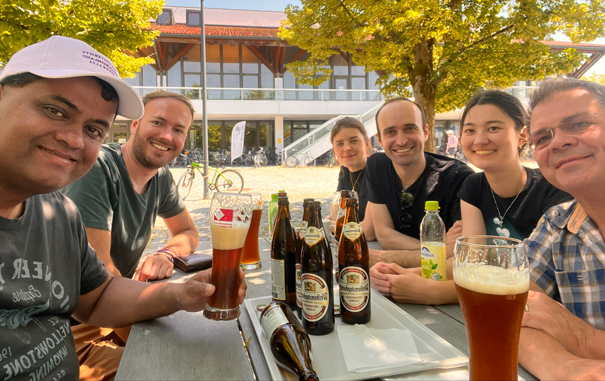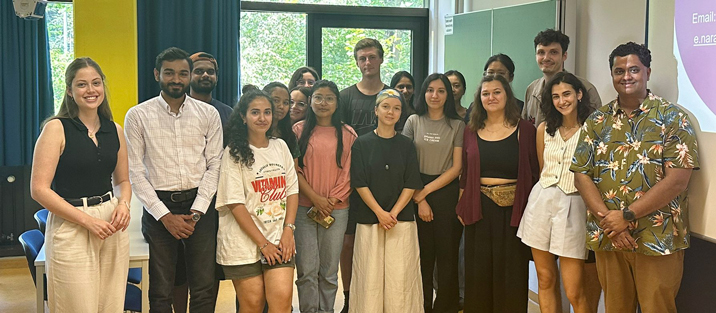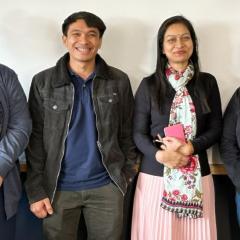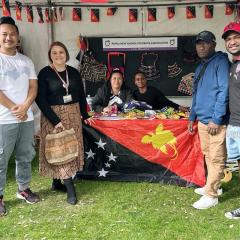UQ and TUM have enjoyed a truly comprehensive and complex partnership for over a decade. Our research strengths across bioeconomies, food science, health science, and green energy are helping to create a healthier and more sustainable future.
This partnership exemplifies how 2 universities from different parts of the world can come together to make a significant impact on education and research, fostering a global community of knowledge and innovation.

Academics can apply for UQ-TUM strategic funding to develop the partnership, in addition to the funds made available to Senior Lecturer in Animal Science Dr Edward Narayan under the TUM Global Visiting Professor Program.
The TUM Global Visiting Professor Program serves to attract new, innovative approaches to cutting-edge research at TUM as well as to internationalise TUM’s curriculum.
In July 2024, Dr Narayan visited Freising Bavaria - one of TUM’s campus sites in a town with roots stretching back to the Middle Ages.
Dr Narayan’s experience as a guest of TUM offered plenty of opportunities to learn about Germany's rich culture, food, and beautiful architecture.
“The friendship of TUM colleagues is what has stayed with me on my return to UQ,” Dr Narayan said.
“Colleagues were very kind towards helping me with anything I needed and made my stay comfortable. I loved the friendly lunch hour with good beer and interactions in the office and lab.”

Dr Narayan was hosted by the Chair of Animal Physiology and Immunology Professor Dr Michael W Pfaffl in the beautiful green campus of TUM. During this visit Dr Narayan delivered a lecture on ‘agriculture sustainability, how we can create a balance between agricultural demands and nature conservation in Australia’ at the World Agricultural Systems Center Hans Eisenmann-Forum for Agricultural Sciences.
He also delivered lectures on animal welfare and sustainable agriculture and demonstrated the application of physiological tools combining epigenetics, smart technology and hormone monitoring tools to study farm animal and wildlife stress biology, and networked with Master of Bioscience students.
“It is simply the best way to experience first-hand world class research, establish exciting collaborations and bring home new ideas and opportunities,” Dr Narayan said.

For now, Dr Narayan and TUM colleagues are working together on competitive grants and planning to host a joint research symposium on the theme of ‘Boosting Agricultural Sustainability Research’ using molecular biology and smart technology.
Dr Narayan’s work with TUM colleagues in agricultural sciences aligns with Queensland and Bavaria’s international research collaboration to support joint research, at the university level, on priority research topics.
Collaborative research priorities supported by the agreement include green hydrogen, synthetic fuels and energy storage; clean tech and emission reduction technologies; artificial intelligence; quantum technologies; additive manufacturing; life sciences, biomedical research and wider bioeconomy; and aerospace.
Current opportunities
Apply for the UQ–TUM Workshop Grant Scheme (closes 5pm AEST, Wednesday 4 September 2024)
- UQ offers the UQ–TUM grant each year to promote a broadening of collaboration between UQ and TUM.
- This Erasmus+ grant is intended to further develop established engagement in the areas of hydrogen & green energy, food sciences, digital agriculture & ai (e.g. agrobotics and automation, digital phenotyping, plant breeding and genetics) as well as in the climate and environment research space (e.g. drought and water management).
TUM Global Visiting Professor Program
- The TUM Global Visiting program is currently on hold. The next call is expected at the end of 2024 / beginning of 2025.
![]() UQ #38 I TUM #33 in Agriculture and forestry (THE World University Rankings, 2024)
UQ #38 I TUM #33 in Agriculture and forestry (THE World University Rankings, 2024)
![]() UQ #1 Agricultural research institution in Australia (NTU Rankings, 2023)
UQ #1 Agricultural research institution in Australia (NTU Rankings, 2023)



